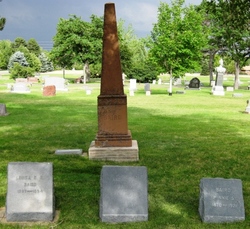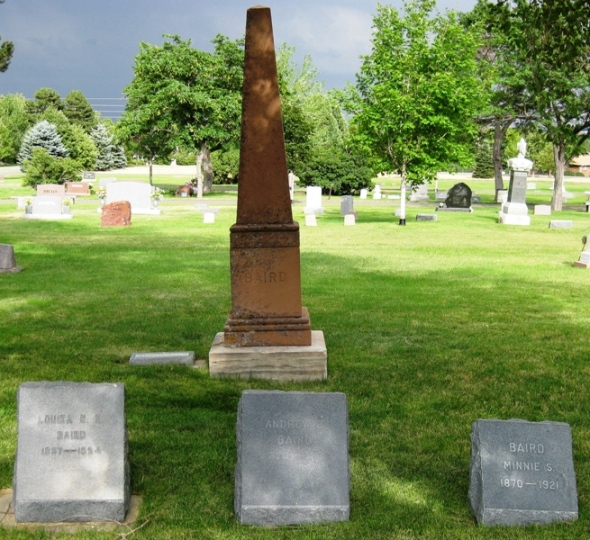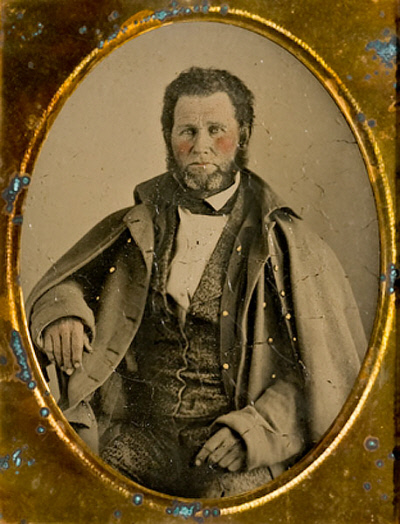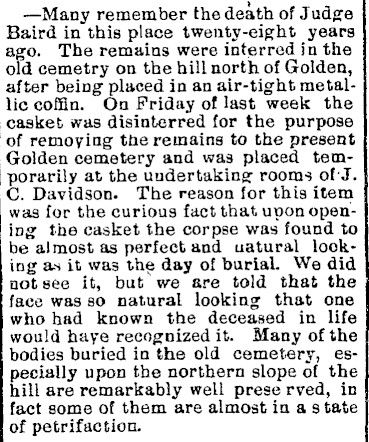Husband of Cassandra Emmacetta (Bowdry) Baird. Father of Andrew Bowdry, Margaret Helen, James Spruce, Agnes Aurora and Pearl B. Son of Andrew S. and Margaret Smith Baird.
Worked as a teacher in Kentucky before moving to Texas, where he lived at Woodville and San Augustine. Was admitted to the Texas state bar and commenced the practice of law at Nacodoches. Appointed Chief Justice of Santa Fe County, Texas by Gov. George T. Wood on May 27, 1848, comprising the region east of the Rio Grande and west of the current boundaries of Texas. However his efforts to set up jurisdiction were unsuccessful as the residents there opposed Texas control as did Col. John M. Washington who was commanding officer at Santa Fe. Baird departed office when the Compromise of 1850 subtracted the area from Texas. Baird remained in New Mexico Territory, purchasing a large estate and becoming a member of its bar to resume his practice of law. Baird served in 1852 as Indian agent to the Navajo tribe. Appointed Attorney General of New Mexico Territory in 1860. When Civil War commenced Baird was compelled to leave the territory due to his sympathy with the Confederacy, was indicted on March 4, 1862 for high treason and his property confiscated. Returning to Texas, Baird became a Major in the Confederate Army and recruited and commanded the 4th Regiment, Arizona Brigade, serving throughout Texas, mostly on the northwest frontier. Departed the military as Brigadier General in July 1865 and in 1867 moved to Trinidad, Colorado Territory, where he again resumed his practice of law. His law practice in southern Colorado was extensive and knowledge of Spanish particularly useful in his profession. Moved to Golden City in 1869, where he continued as an attorney and built his own law office in 1870 (still standing as a private home at 920 10th Street). Became a highly respected citizen and lawyer of Golden and lived in his house still standing at 921 9th Street that is designed in southern style. Remembered by Colorado Transcript editor George West as having "possessed in an eminent degree that courteous manner peculiar to the better class of Southerners. He secured many warm and steadfast friends through his kind-hearted and unselfish dealings with neighbors and fellow men."
In 1872, Judge Baird died in New Mexico while there on business. He was buried there, but was moved to Golden, Colorado in July of 1891 (per "Golden Cemetery, Jefferson County, Colorado Cemetery Series"). He was originally buried at Cemetery Hill in the northern part of the city. In March of 1900 his casket was moved again to its final resting place in the Golden Cemetery. A record of this can be found in an article dated 3-14-1900 from the Colorado Transcript in Jefferson County at www.coloradohistoricnewspapers.org.
Husband of Cassandra Emmacetta (Bowdry) Baird. Father of Andrew Bowdry, Margaret Helen, James Spruce, Agnes Aurora and Pearl B. Son of Andrew S. and Margaret Smith Baird.
Worked as a teacher in Kentucky before moving to Texas, where he lived at Woodville and San Augustine. Was admitted to the Texas state bar and commenced the practice of law at Nacodoches. Appointed Chief Justice of Santa Fe County, Texas by Gov. George T. Wood on May 27, 1848, comprising the region east of the Rio Grande and west of the current boundaries of Texas. However his efforts to set up jurisdiction were unsuccessful as the residents there opposed Texas control as did Col. John M. Washington who was commanding officer at Santa Fe. Baird departed office when the Compromise of 1850 subtracted the area from Texas. Baird remained in New Mexico Territory, purchasing a large estate and becoming a member of its bar to resume his practice of law. Baird served in 1852 as Indian agent to the Navajo tribe. Appointed Attorney General of New Mexico Territory in 1860. When Civil War commenced Baird was compelled to leave the territory due to his sympathy with the Confederacy, was indicted on March 4, 1862 for high treason and his property confiscated. Returning to Texas, Baird became a Major in the Confederate Army and recruited and commanded the 4th Regiment, Arizona Brigade, serving throughout Texas, mostly on the northwest frontier. Departed the military as Brigadier General in July 1865 and in 1867 moved to Trinidad, Colorado Territory, where he again resumed his practice of law. His law practice in southern Colorado was extensive and knowledge of Spanish particularly useful in his profession. Moved to Golden City in 1869, where he continued as an attorney and built his own law office in 1870 (still standing as a private home at 920 10th Street). Became a highly respected citizen and lawyer of Golden and lived in his house still standing at 921 9th Street that is designed in southern style. Remembered by Colorado Transcript editor George West as having "possessed in an eminent degree that courteous manner peculiar to the better class of Southerners. He secured many warm and steadfast friends through his kind-hearted and unselfish dealings with neighbors and fellow men."
In 1872, Judge Baird died in New Mexico while there on business. He was buried there, but was moved to Golden, Colorado in July of 1891 (per "Golden Cemetery, Jefferson County, Colorado Cemetery Series"). He was originally buried at Cemetery Hill in the northern part of the city. In March of 1900 his casket was moved again to its final resting place in the Golden Cemetery. A record of this can be found in an article dated 3-14-1900 from the Colorado Transcript in Jefferson County at www.coloradohistoricnewspapers.org.
Family Members
Advertisement
Explore more
Sponsored by Ancestry
Advertisement








